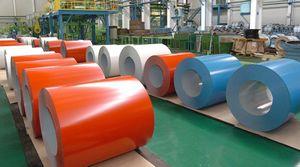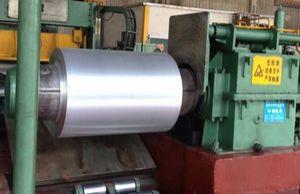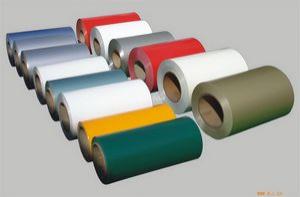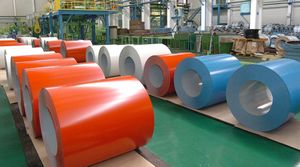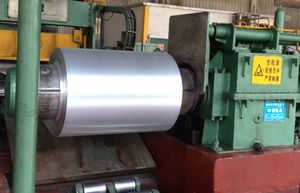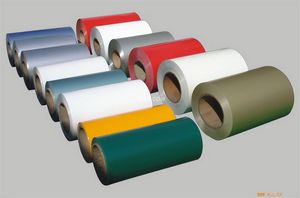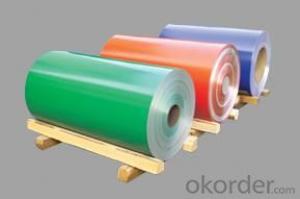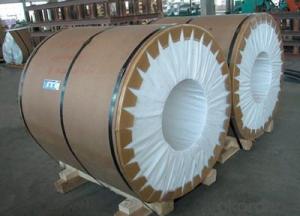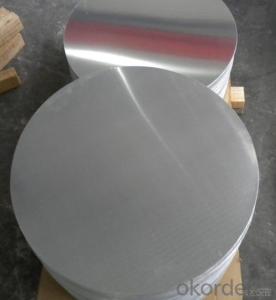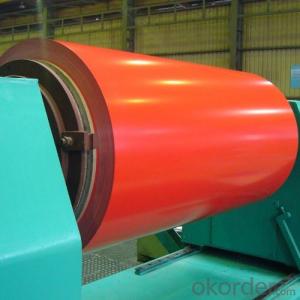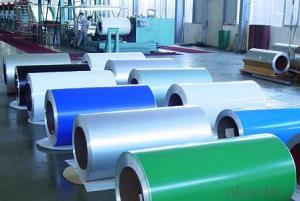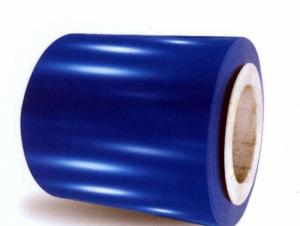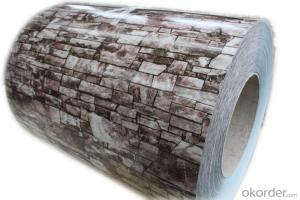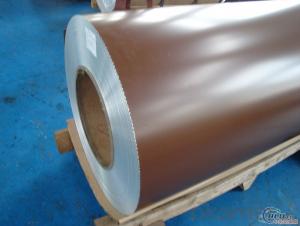PVDF Painted AA 3003 Coated Aluminum Coil
- Loading Port:
- China Main Port
- Payment Terms:
- TT OR LC
- Min Order Qty:
- -
- Supply Capability:
- -
OKorder Service Pledge
Quality Product, Order Online Tracking, Timely Delivery
OKorder Financial Service
Credit Rating, Credit Services, Credit Purchasing
You Might Also Like
supply Mill-finished / coated aluminum plate/sheet/ coil:
Alloy: AA1050,1060,1100,1200,2024,3003,3304,3005,3015,5052,5086,5754,5083,6061,7050,7475,8011, etc
Temper: O, H14/16/18/22/24/32/ H112/H321/T6,T851,T7451,T7351, etc
Thickness: 0.02mm—20mm
Width: 100mm—2000mm (Can be slitted)
Notice: PE coating / PVDF coating / Embossment can be done if required.
Alloy: AA1050,1060,1100,1200,2024,3003,3304,3005,3015,5052,5086,5754,5083,6061,7050,7475,8011, etc
Temper: O, H14/16/18/22/24/32/ H112/H321/T6,T851,T7451,T7351, etc
Thickness: 0.02mm—20mm
Width: 100mm—2000mm (Can be slitted)
Notice: PE coating / PVDF coating / Embossment can be done if required.
- Q: What is the process of manufacturing aluminum coils?
- The process of manufacturing aluminum coils involves several steps. First, raw materials such as aluminum ingots or scrap are melted in a furnace at high temperatures. This molten aluminum is then transferred to a continuous casting machine, where it is solidified into a long, thin slab called a billet. The billet is then heated and passed through a series of rolling mills to reduce its thickness and shape it into a coil. This process, known as hot rolling, involves several passes through the rolling mills, with each pass gradually reducing the thickness of the aluminum. After hot rolling, the coil may undergo various additional processes depending on the desired final product. For instance, it may go through a process called cold rolling, which further reduces the thickness and improves the surface finish of the aluminum. Cold rolling also imparts certain mechanical properties to the metal, such as increased strength and hardness. Next, the coil may be subjected to various surface treatments, such as cleaning, etching, or coating, to enhance its appearance and protect it from corrosion. These treatments may involve chemical processes or application of protective coatings. Finally, the aluminum coil is typically cut into smaller lengths, known as sheets or strips, and packaged for shipment to customers. These sheets or strips may undergo further processing, such as fabrication or forming, to meet specific customer requirements. Overall, the process of manufacturing aluminum coils involves melting and casting the aluminum, hot and cold rolling to shape and refine it, surface treatments for protection and appearance, and cutting and packaging for distribution.
- Q: Is it possible to create baskets or containers using aluminum coils?
- <p>Yes, aluminum coils can be used to make baskets or containers. Aluminum is a lightweight, durable, and malleable material that can be easily shaped and bent into various forms. It is commonly used in manufacturing due to its strength and resistance to corrosion. For baskets or containers, aluminum coils can be woven or molded into the desired shape, offering both functionality and aesthetic appeal. However, it's important to consider the thickness and gauge of the aluminum to ensure the structure's stability and durability for its intended use.</p>
- Q: What specific tools are required for handling and working with aluminum coils?
- <p>Working with aluminum coil typically requires specialized tools to ensure safety and efficiency. Essential tools include a coil cutter for precise cutting, a coil car for easy transportation, and a decoiler for unrolling the coil. Additionally, protective gloves and safety glasses are crucial for personal protection. For more complex tasks, a shear machine or press brake may be necessary for shaping the aluminum. Always follow safety guidelines and use the appropriate tools for the job to prevent accidents and ensure quality work.</p>
- Q: What are the common testing methods for aluminum coils?
- There are several common testing methods for aluminum coils that are used to ensure their quality and performance. These methods include: 1. Visual inspection: This involves a thorough examination of the coils for any visible defects such as dents, scratches, or surface irregularities. Visual inspection is a basic and initial step in the testing process. 2. Dimensional measurement: This method involves measuring the dimensions of the aluminum coils to ensure they meet the specified requirements. This includes measuring the length, width, and thickness of the coils. 3. Tensile testing: Tensile testing is performed to assess the mechanical properties of the aluminum coils, such as their strength and elasticity. This test involves applying a tensile force to a sample of the coil until it breaks or deforms, allowing for the determination of its tensile strength. 4. Hardness testing: The hardness of aluminum coils is an important factor in determining their suitability for specific applications. Various hardness testing methods, such as Rockwell or Brinell hardness tests, can be used to measure the resistance of the coil's surface to indentation or scratching. 5. Chemical composition analysis: This method involves analyzing the chemical composition of the aluminum coil to ensure it meets the required specifications. Common techniques used for this analysis include spectroscopy or X-ray fluorescence (XRF) analysis. 6. Corrosion resistance testing: Aluminum coils are often exposed to harsh environmental conditions, so assessing their resistance to corrosion is crucial. This can be done through various tests like salt spray testing or electrochemical impedance spectroscopy (EIS) to determine the coil's ability to withstand corrosion. 7. Coating quality assessment: If the aluminum coil is coated with a protective layer, testing methods such as adhesion testing, coating thickness measurement, or impact resistance testing can be used to ensure the quality and durability of the coating. These are some of the most common testing methods employed for aluminum coils. By conducting these tests, manufacturers can ensure that the coils meet the required standards and perform optimally in their intended applications.
- Q: Can aluminum coils be used in food processing applications?
- Yes, aluminum coils can be used in food processing applications. Aluminum is a widely used material in the food industry due to its excellent thermal conductivity, corrosion resistance, and lightweight properties. Aluminum coils are commonly used in food processing equipment such as refrigerators, ovens, and food storage units to ensure proper temperature control and hygiene during food processing.
- Q: Are there any safety considerations when handling aluminum coils?
- Yes, there are several safety considerations when handling aluminum coils. Firstly, aluminum coils can be heavy and unwieldy, so it is important to use proper lifting techniques or mechanical lifting equipment to avoid strain or injury. Secondly, aluminum coils can have sharp edges or corners, so it is important to wear protective gloves and use caution when handling them to avoid cuts or punctures. Additionally, aluminum can conduct electricity, so it is important to ensure that coils are properly grounded to prevent electrical shock. Furthermore, aluminum coils can be very slippery when wet or oily, so it is important to maintain a clean and dry working area to prevent slips, trips, and falls. Lastly, aluminum can react with certain chemicals, so it is important to handle and store coils away from incompatible substances to prevent any chemical reactions or hazardous situations. Overall, by following proper handling procedures, wearing appropriate personal protective equipment, and being aware of potential hazards, the risk of accidents and injuries when handling aluminum coils can be greatly reduced.
- Q: actually pollute more than the process of extracting it from earth and producing new aluminum?I saw a report about 5 years ago on this and was wondering if anyone else had info on this subject.
- Much less smelting required to convert pure aluminum into aluminum ingots than is needed to process boxite(?) into aluminum ingots.
- Q: Is it possible to utilize a grinder for cutting aluminum coils?
- <p>Yes, you can use a grinder to cut aluminum coils, but it's important to use the right type of grinder and accessories. An angle grinder with a cutting wheel or a metal cutting disc is suitable for this task. Ensure the grinder is equipped with a safety guard and that you're wearing appropriate safety gear, such as goggles and gloves. Be cautious as aluminum can be slippery and the grinder can generate a lot of heat, which may require frequent cooling to prevent the disc from burning out. It's also advisable to work in a well-ventilated area due to the fine particles produced during cutting.</p>
- Q: How many 1220mm*2440mm aluminum sheets can one-ton aluminum coil be sliced to? Thank you.
- You should know the thickness of aluminum sheet first, and then calculate the weight of aluminum sheet of this specification, and finally use 1T divide the weight.
- Q: How are aluminum coils used in heat exchangers?
- Aluminum coils are widely used in heat exchangers due to their excellent thermal conductivity and corrosion resistance properties. Heat exchangers are devices that transfer thermal energy between two or more fluids, and aluminum coils play a crucial role in facilitating this heat transfer process. In a typical heat exchanger, aluminum coils are used as the primary component for the heat transfer surface. These coils are usually made of thin aluminum sheets that are formed into a tube-like shape, creating a large surface area for efficient heat transfer. The coils are often arranged in a serpentine pattern to maximize the contact area between the fluid being heated or cooled and the coil surface. The fluid that needs to be heated or cooled passes through the coil, while another fluid, usually water or air, flows over the coil surface. As the fluids come into contact with the aluminum coil, heat is transferred from one fluid to the other through conduction. The high thermal conductivity of aluminum allows for quick and efficient heat transfer, resulting in effective temperature control. Moreover, aluminum coils are highly resistant to corrosion, which is crucial for heat exchangers that come into contact with various fluids, some of which may be corrosive. This corrosion resistance ensures the longevity and durability of the heat exchanger, reducing maintenance and replacement costs. Additionally, aluminum coils are lightweight and easily formable, making them suitable for different heat exchanger designs and configurations. This flexibility allows manufacturers to create compact and space-efficient heat exchangers that can be installed in various applications, such as HVAC systems, refrigeration units, automotive radiators, and industrial processes. In conclusion, aluminum coils are used in heat exchangers due to their excellent thermal conductivity, corrosion resistance, lightweight nature, and formability. These coils effectively transfer heat between fluids, ensuring efficient temperature control and enabling the proper functioning of various heating and cooling systems.
Send your message to us
PVDF Painted AA 3003 Coated Aluminum Coil
- Loading Port:
- China Main Port
- Payment Terms:
- TT OR LC
- Min Order Qty:
- -
- Supply Capability:
- -
OKorder Service Pledge
Quality Product, Order Online Tracking, Timely Delivery
OKorder Financial Service
Credit Rating, Credit Services, Credit Purchasing
Similar products
Hot products
Hot Searches
Related keywords
